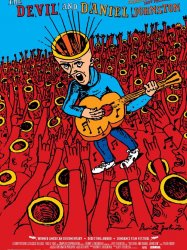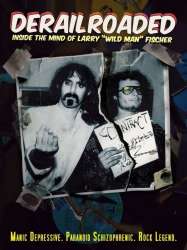Life. Support. Music. is a american film of genre Documentary with Norah Jones
Life. Support. Music. (2008)

If you like this film, let us know!
- Infos
- Casting
- Technical infos
- Photos
- Videos
- Film quotes
- Characters
- Music
- Awards
OriginUSA
Genres Documentary
Themes Films about music and musicians, Documentary films about music and musicians, Documentaire sur une personnalité, Documentary films about health care, Musical films, Films about disabilities
Rating71%










Life. Support. Music. is a 2008 documentary film and is Eric Daniel Metzgar's second documentary. It premiered at the 2008 Full Frame Documentary Film Festival in Durham, North Carolina.
Actors
Comments
Leave comment :
Suggestions of similar film to Life. Support. Music.
There are 2 films with the same actors, 8961 with the same cinematographic genres, 9400 films with the same themes (including 4 films with the same 6 themes than Life. Support. Music.), to have finally 70 suggestions of similar films.If you liked Life. Support. Music., you will probably like those similar films :
 , 1h50
, 1h50Directed by Jeff Feuerzeig
Origin USA
Genres Documentary, Musical
Themes Medical-themed films, Films about music and musicians, Documentary films about music and musicians, Documentaire sur une personnalité, Documentary films about health care, Musical films, Films about psychiatry, Films about disabilities
Actors Matt Groening
Rating78%





Portrait de l'Américain Daniel Johnston, artiste maudit, songwriter culte et illustrateur, qui souffre de maniaco-depression.

Bob and the Monster (2011)
, 1h25Origin USA
Genres Documentary
Themes Medical-themed films, Films about music and musicians, Films about drugs, Documentary films about music and musicians, Documentaire sur une personnalité, Documentary films about health care, Musical films, Films about psychiatry, Films about disabilities
Actors Michael Peter Balzary, Courtney Love, Brett Gurewitz, Zander Schloss
Rating73%





This documentary film follows outspoken indie-rock hero Bob Forrest, through his life-threatening struggle with addiction, to his transformation into one of the most influential and controversial drug counselors in the US today. Bob and the Monster crafts contemporary footage, animation and compelling interviews with archival performances and personal videos from Bob's past to reveal the complex layers of this troubled, but hopeful soul. Testimony from his peers, including John Frusciante, Flea, Anthony Kiedis, Steven Adler and Courtney Love add texture, but it's the depth of Bob's music, interwoven throughout the film, that illuminates this unforgettable and inspirational story.
 , 1h31
, 1h31Origin USA
Genres Documentary, Musical
Themes Medical-themed films, Films about music and musicians, Documentary films about music and musicians, Documentaire sur une personnalité, Documentary films about health care, Musical films, Films about psychiatry, Films about disabilities
Actors Kurt Loder
Rating75%






Derailroaded (2005)
, 1h26Origin USA
Genres Documentary, Musical
Themes Medical-themed films, Films about music and musicians, Documentary films about music and musicians, Documentaire sur une personnalité, Documentary films about health care, Musical films, Films about psychiatry, Films about disabilities
Actors Captain Beefheart, Weird Al Yankovic, Bill Mumy, Frank Zappa, Miguel Ferrer, Dick Martin
Rating73%






Heavy Load (2008)
, 1h30Origin United-kingdom
Genres Documentary, Musical
Themes Films about music and musicians, Documentary films about music and musicians, Documentaire sur une personnalité, Musical films, Films about disabilities
Rating69%





 , 58minutes
, 58minutesOrigin USA
Genres Documentary, Musical
Themes Films about music and musicians, Documentary films about music and musicians, Documentaire sur une personnalité, Musical films, Films about disabilities
Rating71%





Shot in and around Willis' native Chicago area, the documentary simply shows footage of Willis' daily life with his songs serving as the soundtrack. Willis appears unkempt, obese and mentally unstable.
 , 1h45
, 1h45Directed by Jon Chu
Origin USA
Genres Documentary, Musical
Themes L'adolescence, Films about children, Medical-themed films, Films about music and musicians, Documentary films about music and musicians, Documentaire sur une personnalité, Musical films, Films about psychiatry, Films about disabilities, Films about autism
Actors Justin Bieber, Usher, Jaden Smith, Miley Cyrus, Snoop Dogg, Ludacris
Rating17%





The film follows the pop star Justin Bieber during 10 days counting down to what is considered his biggest performance, that of August 31, 2010 in Madison Square Garden, which sold out in 22 minutes. It shows footage of the performances during this period from his My World Tour. It shows excited female fans, and several instances of the "One Less Lonely Girl" routine of inviting a girl on stage for him to serenade and give flowers to, and of surprising random girls with free tickets to his concerts. The main people around Bieber, being like family and good friends to him, are interviewed, but Bieber himself is not. Various instances of praying together before a show are shown.

Dear Jack (2009)
, 1h7Origin USA
Genres Documentary
Themes Medical-themed films, Films about music and musicians, Documentary films about music and musicians, Documentaire sur une personnalité, Documentary films about health care, Musical films, Films about cancer
Rating83%





On May 27, 2005, McMahon was forced to cancel all of his upcoming concerts after a medical examination in connection with a relentless case of laryngitis forced him into being admitted into a hospital in New York City. On June 1, 2005, he was diagnosed with acute lymphoblastic leukemia, the same day he finished recording his debut album under the Jack's Mannequin moniker, Everything in Transit. Since the illness was diagnosed in its early stages, McMahon's doctors had high hopes for a full recovery.

Sibi, l’âme du violon (2010)
, 38minutesOrigin Burkina faso
Genres Documentary
Themes Films about music and musicians, Documentary films about music and musicians, Documentaire sur une personnalité, Musical films, Films about disabilities
A blind violinist called Sibi has been singing and playing in cabarets in the most popular neighborhoods of Koudougou, Burkina Faso, for more than 30 years. He knows the origins of the ethnic groups and the most important family lines in the region. The film goes to the encounter of this extraordinary man who holds, despite himself and surrounded by general indifference, the living history of the region, and its oral traditions, now threatened with extinction. A message in a bottle before it is too late and these memories disappear forever.
 , 17minutes
, 17minutesDirected by Nathaniel Kahn
Origin USA
Genres Documentary
Themes Films about music and musicians, Documentary films about music and musicians, Documentaire sur une personnalité, Films about classical music and musicians, Musical films, Films about disabilities
Rating63%





 Connection
Connection
